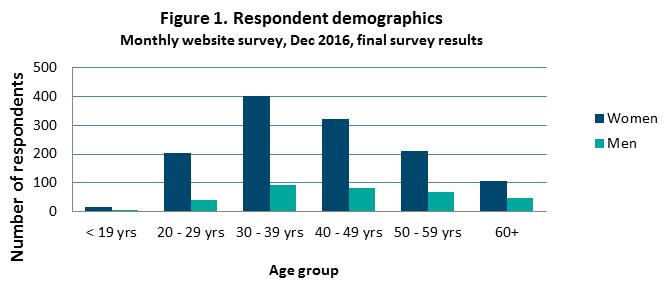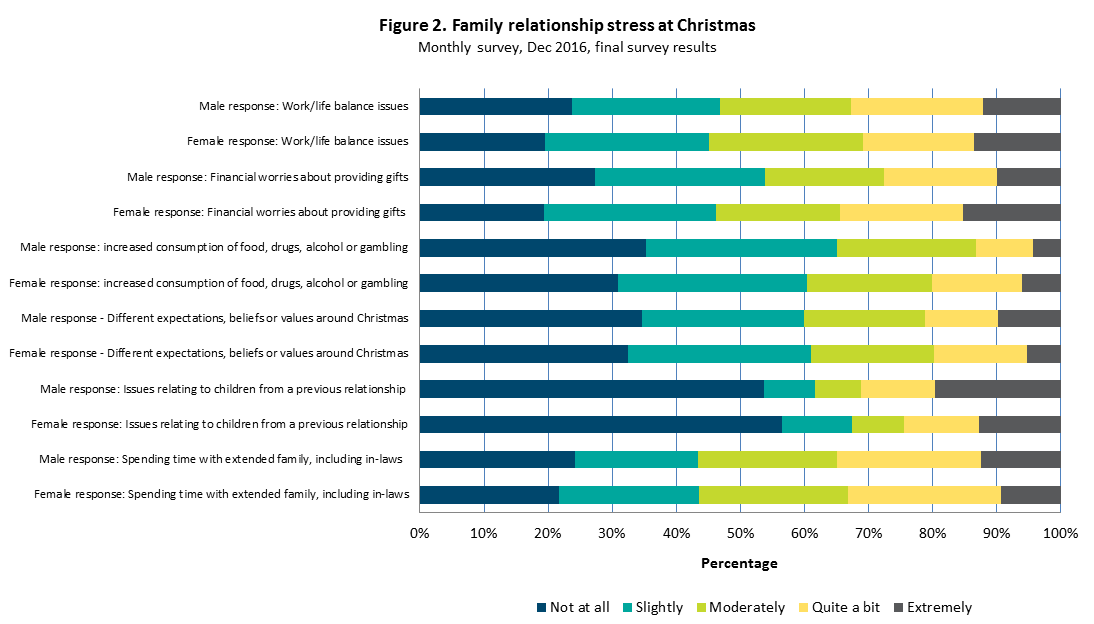Introduction
For the past three Christmas periods, Relationships Australia has examined the effect of Christmas stress on family relationships in our two-minute online monthly survey. These questions identify the Christmas period as a time of high stress for a significant number of families.
Evidence identifies the Christmas period as the most likely time of the year for many people to experience anxiety and depression, particularly those who are divorced, have experienced a death in the family or are socially isolated. Increased stress over the Christmas period has been associated with financial and time pressure from the costs of buying gifts, entertaining and holidays, and managing competing work-family tensions. There can be added strain from spending time with family members and it also may represent a time when people negatively reflect on another lost year. Those people living in separated, blended or stepfamilies can face significant challenges in managing complex family structures and contact arrangements with children.
Relationships Australia sought to further explore the effect of Christmas stress on family relationships by asking visitors to our website to participate in the December 2016 two minute survey. Results were compared with questions asked in the online survey in December 2014.
Previous research finds that…
- Christmas is considered as one of the six most stressful life events, along with divorce, moving house and changing jobs.
- In one survey of over 3,000 people, 86% reported that they find buying presents to be difficult and 65% reported Christmas shopping a stressful experience.
- A North American survey reported that 45% of respondents dreaded the festive season.
Results
More than 1650 people responded to the Relationships Australia online survey in December. Just under eighty per cent of survey respondents (79%) identified as female.
As was the case for last month’s survey, more females than males responded in every age group (figure 1). Ninety per cent of survey respondents were aged between 20‑59 years, with the highest number of responses collected for women aged between 30-39 years (inclusive).
The demographic profile of survey respondents remains consistent with our experience of the people that would be accessing the Relationships Australia website.

For the purposes of this report, family relationships were considered to be highly negatively affected by stress at Christmas if survey respondents reported that their family relationships were ‘extremely’ negatively affected or these relationships were affected ‘quite a bit’. The results were examined separately for each of the six factors captured by the survey questions (see figure 2).
Around one-third of survey respondents indicated that their family relationships were highly negatively affected at Christmas due to work-life balance factors (men 31%, women 33%). One third of people responding to the monthly survey also reported that their family relationships were highly negatively affected due to financial worries at Christmas (men 28%, women 34%), with men reporting lower rates of relationship stress due to financial worries than was reported by male survey respondents in 2014 (33%).
When asked about the effects of increased consumption of food, drugs, alcohol or gambling on their family relationships at Christmas, 20 per cent of women and 13 per cent of men reported that their family relationships were highly negatively affected. This was a higher proportion of women and a lower proportion of men reporting relationship stress due to increased consumption of food, drugs, alcohol or gambling than in 2014 (16%). Around one-fifth of men and women (20%) reported their family relationships were highly affected by different expectations, beliefs or values around Christmas. This was a lower proportion of men who reported their family relationships were highly affected due to this factor when compared to the results of the 2014 online survey (25%).
More than one-quarter of survey respondents choosing to answer the question reported that their family relationships were highly affected by issues relating to children from previous relationships at Christmas, a higher result than was reported in 2014. While this question had a lower relevance to some survey respondents than other questions[1], the result is indicative of a continuing high rate of family relationship stress at Christmas for blended and/or separated families.
Similar to results reported in 2014, a substantial minority of men responding to the monthly online survey reported negative effects on family relationships related to spending time with extended family, including in-laws (35%). Around one-third (33%) of women also reported that their family relationships were highly affected by spending time with extended family at Christmas.

[1] Around one-third of survey respondents indicated that this question was ‘not applicable’.
References
Hawton, K. (1997). Attempted suicide. In Cognitive Behaviour Therapy: Science and Practice (eds D. Clark and C. Fairburn), pp. 285-312. Oxford: Oxford University Press.
Hawton, K. (2000). Sex and suicide: Gender differences in suicidal behaviour, British Journal of Psychiatry, 177:484-485.
National Mental Health Commission (NMHC). 2013: A contributing Life, the 2013 National Report Card on Mental Health and Suicide Prevention. Sydney: NMHC.
https://www.psychologytoday.com/blog/wired-success/201011/why-people-get-depressed-christmas